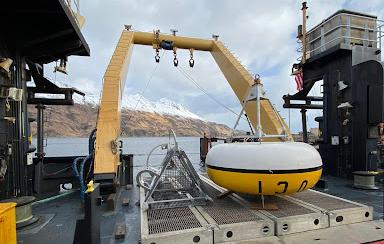
FOCI mooring ready for deployment in the Bering Sea aboard the NOAA Ship Oscar Dyson. The M2 surface mooring that has been deployed each spring in the southeastern Bering Sea for over 25 years. This critical mooring provides year-round measurements of temperature, salinity, nitrite, chlorophyll, and currents in this highly productive area. For the last 10 years, partial pressure in CO2 (pCO2) and pH measurements have also been taken at M2.
An annual survey is underway to provide baseline fisheries and oceanographic data to support sustainable management of living resources in the Bering Sea and the rapidly changing US Arctic ecosystem. These surveys provide key data in understanding and monitoring events such as sea-ice loss and the cold pool and how these are impacting the Arctic ecosystem.
This spring mooring cruise brings together scientists from NOAA’s PMEL and Alaska Fisheries Science Center, University of Washington, US Fish and Wildlife, and the University of Alaska. While aboard the NOAA Ship Oscar Dyson, the scientists will service a biophysical mooring array in the Bering Sea, collect conductivity, temperature, depth (CTD) profiles, zooplankton and ichthyoplankton samples and conduct special projects related to harmful algal blooms and zooplankton machine learning. Results from these observations and experiments will help describe important ecosystem linkages among climate, plankton, fishes, birds and mammals.
EcoFOCI will be field testing and using several technologies this summer, including pop-up floats, a remote access sampler and a new shallow-water glider. These technologies aim to enhance shipboard and mooring research with more data collection in a fine scale region.
NOAA’s EcoFOCI program is leading 5 research cruises this March to October in the Alaska region.


